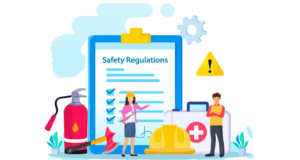What is OSHA Training for Healthcare Professionals?
These employers are responsible for complying with OSHA safety standards, in addition to laws and regulations governing the practice of medicine. OSHA training for healthcare professionals is discussed below.
What is OSHA Training for Healthcare Professionals? Employers vs. Employees
Online OSHA training for healthcare professionals is not the same training as OSHA training for healthcare workers. The Occupational Safety and Health Act (“OSH Act”) and its regulations require this distinction. Under the OSH Act, employers have a responsibility to provide a safe workplace. This means healthcare professionals must run their practices free of serious recognized hazards, and examine workplace conditions to make sure they conform to applicable OSHA standards. It is the responsibility of a healthcare worker to follow an employer’s safety rules, but it is the responsibility of the employer to develop and enforce those rules in the first place.
OSHA offers outreach training through which employers themselves are trained on OSHA standards. This training is offered under OSHA’s Outreach Training Program, and is referred to as “train the trainer” instruction. Once the professionals are trained, they then must train the employees. OSHA offers a number of resources employers can use to understand the regulations so they can then develop training programs. These resources offer guidance as to how to deliver effective OSHA training for healthcare employers.
Under this guidance, sound “train the trainer” OSHA training for healthcare professionals should be:
Accurate
Training materials should be prepared by qualified individuals, and updated as needed. OSHA training for healthcare professionals should be facilitated by experienced individuals using up-to-date and appropriate training techniques, methods, and materials.
Credible
Training facilitators should have a general safety and health background, or be a subject matter expert in a health of safety-related field. Subject matter expertise can be obtained through online courses or prior job experience. Facilitators, who provide OSHA training for healthcare professionals, should also have experience with training adults. Practical experience in the field of safety and health, as well as experience in training facilitation, both contribute to a higher degree of trainer credibility.
Clear
OSHA training for healthcare professionals must be clear. If the training is unclear, that lack of clarity will show itself when it comes time for practice owners to train their own employees. A “clear” training program is one that is understandable to the healthcare professional. Jargon that is used by and among healthcare professionals, may be used by the trainer. Jargon not used by healthcare professionals – say, jargon used by engineers – will not be useful to doctors, dentists, and other practice owners.
Practical
If an employer violates an OSHA standard, the employer is subject to OSHA investigation and fines. Training, or lack thereof, has real-world consequences, and the trainer should understand that training should therefore be as practical as possible. The standards, when broken down to their individual components, are sets of rules. Either the rules are followed, or they are not. To ensure training is practical, trainers should present information, ideas, and skills that healthcare professionals see as directly useful in their working lives as both practitioners and business owners. Successful training occurs when professionals can see how information presented in a training session can be applied in the workplace. For example, OSHA requires employers to train employees on the dangers of hazardous substances, and what employees can or must do to protect themselves from these hazards. Training should be sufficiently practical to allow an employer to visualize what can go wrong if the hazardous substances training delivered to an employee is inadequate: an employee who, say, does not know how to read a Safety Data Sheet (employers must train employees on how to read these), and therefore does not know a particular chemical he or she is working with is flammable, improperly stores the chemical. A fire breaks out. As a result, there will be damage to property and equipment, the employee will suffer injuries and maybe burns, and time may be missed from work. Pointing out these practical consequences is part of an effective OSHA training for healthcare professionals program.








